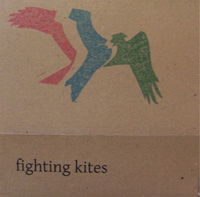There is a quiet, almost reverential vibe to this record, nothing is bombastic, and for an instrumental record it’s rare in that it doesn’t wig out or try to make a racket.
There is a quiet, almost reverential vibe to this record, nothing is bombastic, and for an instrumental record it’s rare in that it doesn’t wig out or try to make a racket.

Variant Records
Fighting Kites’ debut is a light and airy record, with elements of a trippy English Pastoral vibe always threatening to break in. Predominantly mid-paced in tempo and blessed with an easy going groove plus a great balance of semi acoustic tones and reedy organ sounds, a record like this is something I’ve not heard in a while. It has the feeling of John Barleycorn Must Die at times, or Kevin Ayers.
The template is set pretty much from the word go; there aren’t many surprises in store, but then this record is all about sitting back and enjoying the ride. Chuck Close and Grey Starling are driven by rolling cyclical guitar melodies that are sometimes allowed to pick their own way through the songs– otherwise they are joined by the most unobtrusive of instrumentation which only serves to create a charming build-up of sound.
There is a quiet, almost reverential vibe to this record, nothing is bombastic, and for an instrumental record it’s rare in that it doesn’t wig out or try to make a racket. When things get a little frisky, such as in Apartment Hotel or Butterbean it’s presented in an abstract, jazzy and decidedly semi acoustic manner: nothing is too heavy and the brass squirts and squiggles provide the main noise. In fact the way the record is put together reminds me at times of the delicate, spindly jazz-folk arrangements of Iren Lovasz & Teagrass’s brilliant Wide is the Danube. Or some of the more folky bits on AD2’s Yeti, such as Sandosz in the Rain. The harpsichord-like keys in Bowling Alone and the demented flute sound that opens Eyelash (and the ghostly guitar sound that breaks the track up amidships) really do have you thinking back to the late 60s as does the guitar twang of Carlos Mends Shoulder. Things get softer towards the end with Mustard After Dinner, Roast and Health and Efficiency but the blissed out ending is pretty suitable for such a record.
You need to play this LP a couple of times to enjoy its subtleties but it’s worth it.
